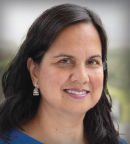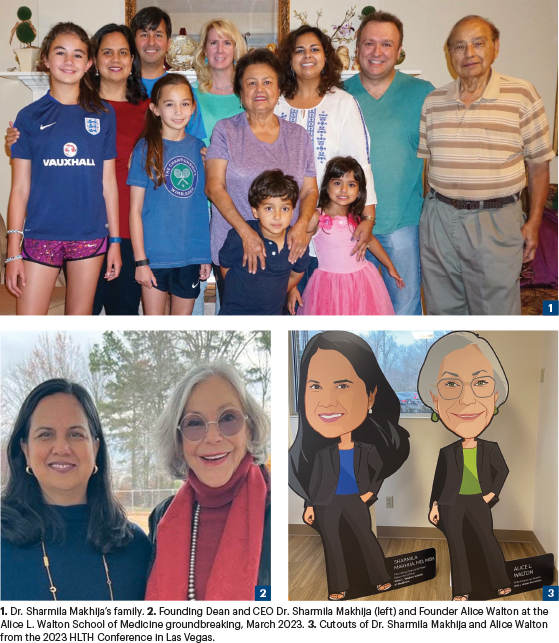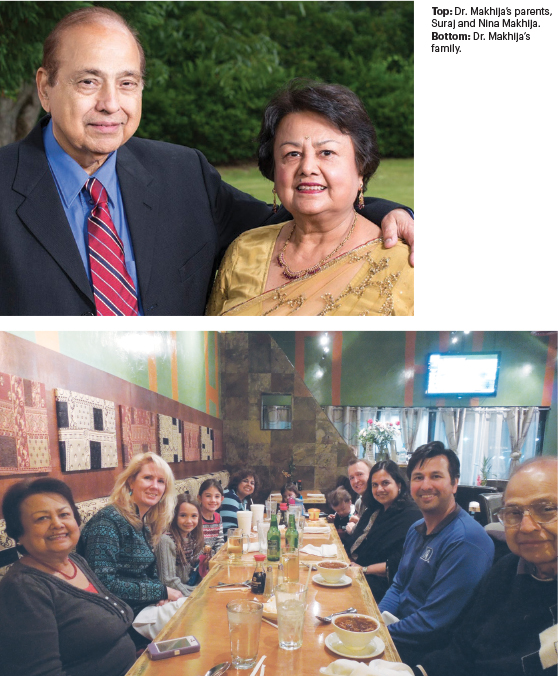Deputy Editor of The ASCO Post, Jame Abraham, MD, FACP, recently spoke with gynecologic cancer expert Sharmila K. Makhija, MD, MBA, about her journey to her current position as Founding Dean and Chief Executive Officer of the Alice L. Walton School of Medicine, Bentonville, Arkansas.
Sharmila K. Makhija, MD, MBA

TITLE
Founding Dean and Chief Executive Officer, Alice L. Walton School of Medicine, Bentonville, Arkansas
MEDICAL DEGREES
MD: University of Alabama, Birmingham
MBA: Emory University Goizueta Business School, Atlanta
ON THE WALTON SCHOOL OF MEDICINE
“Just this past year, I became Founding Dean and Chief Executive Officer of the Alice L. Walton School of Medicine. What originally brought me to this position was the fact that this new medical school is approaching teaching medicine the way I feel like I was trained and continue to practice. That is, our teams are looking at how to take care of the whole person, not just the illness, and also asking how we can possibly prevent that illness. Our school is using a traditional curriculum while enhancing it with the arts, humanities, and whole health principles. And I say that respectfully because to build a medical school is not for the faint of heart.”
Raised by Educators
Dr. Makhija was born and reared in Montgomery, Alabama, to parents who were in the education field. “My dad was a college chemistry professor who earned his PhD at Indiana University. And my mom was a high school biology teacher who completed her master’s degree in biology while she and dad raised three children. As a family, we knew the importance of education, and at the dinner table every night, my mom and dad would typically ask us: What did you learn today? And it evolved over the years into a larger question: What did you do to help make someone else’s world better? It wasn’t anything intense, just casual conversation. To this day, we still talk as a family like that. I feel like that was a great foundation for me, because as I moved into leadership positions, I always tried to emulate that conversation with our faculty, residents, and students, exploring how we could help a patient or help each other as colleagues, rather than this is what I want because it helps me,” she shared.
Dr. Makhija continued: “I was about 9 when I declared to my parents that I wanted to become a doctor. My mom’s dad was a doctor, and her brother is a doctor. I really wanted to spend time with my grandparents in India to confirm whether this was what I wanted to do. I went to India by myself and spent the summer with my grandparents. I would carry my grandfather’s doctor bag and go with him to see patients. And I loved every minute of it. A lot of patients would be lined up in the hallways of the clinic, and they would bring their own children or grandchildren who spoke English. I’d speak to them, find out what the problem was, and report it to my grandfather. After that, I knew what kind of career I wanted.”
Returning Home for Medical School
After graduating from high school, Dr. Makhija went to Cornell University as a premed student, earning her BA in chemistry. She returned home for medical school, entering the University of Alabama at Birmingham School of Medicine (UAB). “At med school, I couldn’t decide between pediatrics and internal medicine and thought, well, I’ll do internal medicine because that could lead to working in the field of cardiology or gastroenterology, and I liked those doctors. Their personalities were really wonderful. I saw what they did for patients, and I wanted to be like them,” she explained.
Dr. Makhija continued: “I started an OB-GYN rotation, and when one of my classmates fell ill, I was asked to cover his rotation in gynecologic oncology. As soon as I spent maybe 2 hours with that team at UAB, I knew I had to redo my residency applications and go into OB-GYN. Those particular faculty were both technically good with surgical skills and incredibly compassionate. That compassion connected with me, and I also clicked with the patient population. These patients needed a physician who could empathize with them, understand what their families were going through, and be able to connect.”
A Valuable Lesson
Dr. Makhija completed her obstetrics and gynecology residency at the University of Louisville Hospital and a fellowship in gynecologic oncology at Memorial Sloan Kettering Cancer Center (MSKCC) in New York. Asked whether there was a particular mentor who stood out in her residency and fellowship programs, Dr. Makhija replied:
“Dr. Bill Hoskins was Chief of the Gynecologic Oncology Service at MSKCC when I was a fellow, and by chance, I had the opportunity to work with him on a complex radical hysterectomy early on during my research year. He was an ex-military guy, not much of a talker. At one point, during the surgery, there was some bleeding, and as I went into control mode to stop it, he started telling this story about his first job as a young guy in Tennessee delivering fried chicken in a truck with a big plastic chicken on top and how he wore a hat shaped like a chicken.”
Dr. Makhija continued: “I was puzzled, wondering why he was telling me this funny bizarre story as we’re trying to stop the patient’s bleeding. Then I realized that without saying it, he was showing me it was important, while we waited for the bleeding to slow or stop, to take a minute to relax, think, and then proceed. I just admired him for not overreacting, and I’ve always tried to emulate that. He helped me become a better surgeon, and to this day, he’s still my mentor. Every move I’ve made in my career or in life, I’ve spent time talking to him (as well as his wife, Dr. Iffath Hoskins, who is a high-risk OB-GYN).”
Multiple Moves
Following her fellowship at MSKCC, Dr. Makhija held faculty positions at the University of Pittsburgh Magee-Womens Hospital and UAB, where she received the Argus Teaching Award from the medical school. She then moved to Emory University, where she became Division Chief of Gynecologic Oncology, a Georgia Cancer Coalition Distinguished Cancer Scholar, and the Leach Endowed Chair in Obstetrics and Gynecology. She also received her executive MBA from Emory University Goizueta Business School.
Dr. Abraham asked Dr. Makhija why she decided to get an MBA just as her surgical career was in full swing. “At Emory, I was faced with an endowment that was cut in half as a result of the financial crisis in 2008 while trying to build a gynecologic oncology clinical trials program. I recall having this conversation with the finance team, and I realized I didn’t know their language and they didn’t really know my language either. So, I immediately signed up for an MBA to learn the language of accounting and finance, which I think has helped me understand how to design better programs when I went on to be Department Chair at other institutions,” she shared.
Dr. Makhija added: “My mentor at business school, Prof. Rick Gilkey, was a lovely person whose expertise was focused on organization management. He also had an appointment in the Department of Psychiatry at the medical school. His crossover work with functional MRIs and marketing was fascinating. During that period, I learned that when it comes to financial planning and implementing changes, it’s sometimes better to slow down and explain things more clearly. Things don’t have to be done immediately. It’s a process, and it may be best to pivot to a different, hybrid way of doing something.”

After Emory, Dr. Makhija served as a tenured Professor and Department Chair of Obstetrics, Gynecology, and Women’s Health as well as the Baxter Endowed Chair at the University of Louisville School of Medicine. While there, she also served as Chief Medical and Operations Officer at the Center for Women and Infants.
Next, she became Department Chair of Obstetrics & Gynecology and Women’s Health, Professor of Gynecologic Oncology, and the The Chella and Moise Safra Endowed Chair at the Albert Einstein College of Medicine and Montefiore Medical Center. Asked to shed light on her road to Montefiore, Dr. Makhija commented: “I had been a member of the Executive Leadership Academy for Women, and I was on stage with my mentor Dr. David Dunn at Louisville, who was Executive Vice President of Health Affairs, to give an informal talk about mentorship. It so happened that the Dean at Albert Einstein College of Medicine, Dr. Allen Spiegel, was sitting in the audience, and he came up to us and said to me, ‘I’d like you to interview for the Department Chair position.’ And my boss and mentor said, ‘Wait, are you really doing this in front of me?’”
Dr. Makhija continued: “I thought it was a great opportunity, because it was a bigger and more complex department at Montefiore, focused on serving the underserved community in the Bronx, NY. This resonated with me, and I was drawn to challenging our teams to do more impactful work. And I love the fact that Dr. Dunn was supportive of this move. I was Department Chair of Women’s Health for 8 years at Montefiore.”
Current Work
Asked about her current position, Dr. Makhija replied: “This past year, I became Founding Dean and Chief Executive Officer of the Alice L. Walton School of Medicine in Bentonville, Arkansas. What originally brought me to this position was the fact that this new medical school is approaching teaching medicine the way I feel like I was trained and continue to practice. That is, our teams are looking at how to take care of the whole person, not just the illness, and also asking how we can possibly prevent that illness. Our school is using a traditional curriculum while enhancing it with the arts, humanities, and whole health principles. And I say that respectfully because to build a medical school is not for the faint of heart. For one, it’s striving to meet many accreditation standards, as it should be. It’s been a growing experience for me and a challenge, but when you enjoy it, it doesn’t feel like work.”

Dr. Makhija added: “It’s interesting, because my dad passed away a few years ago, and he told me that in my future career, I was going to be the dean of a medical school. He was not alive while I was considering my present job, and it reminded me of the conversations about education and working with people that I’d have with dad and mom at the dinner table.”
According to Dr. Makhija, mentoring students on a holistic level is a key part of her oversight at the Alice L. Walton School of Medicine. “We’re looking at incorporating wellness coaches to promote self-care for our faculty, staff, and students. We are working with the Heartland Whole Health Institute, our sister organization, on developing that model; we want students to be able to know how to take care of themselves in order to learn how to take care of others. Burnout is a worrisome issue in many fields, especially in health care. We feel very strongly that this approach for students is the way to improve medical education and ultimately the care delivered to patients,” said Dr. Makhija.
Decompressing From a Busy Career
How does a super-busy oncology leader decompress? “I grew up going to the YMCA with my family. We either had family swim night or tennis. I don’t play tennis anymore, but I’m still a swimmer. It’s a great overall exercise and helps me to relax. I find the sound of water very soothing. When I was in New York, there was a pool upstairs at the apartment building, so I used to swim every night, and I had an underwater iPod. I would download books or music and swim to that. And that’s what I enjoy doing to relax,” Dr. Makhija explained.
“I also like to cook, entertain, and just spend time with friends and families,” she continued. “And if I can add another interest, I enjoy art. It’s incredible to have our school on the campus of Crystal Bridges, which is a world-renowned art museum in Bentonville. I have been learning more about the impact of art on the brain and overall well-being. My appreciation for art, the curators, and educators in the art world has been an incredible learning experience and fills my soul. I’ve become a different kind of art lover than I ever expected. It helps me to unwind, and it’s a very peaceful way to spend time. We are now working on integrating the arts in the medical curriculum in an intentional way.”

Closing Thoughts
Asked about the challenges of being a woman in a leadership position, Dr. Makhija shared these comments: “Every place I have worked as a department chair, there may have been only one or two women serving as chairs, so it’s still a challenge everywhere. To that end, I’m trying to remove obstacles wherever I see them. One of the first things I did at Montefiore was to make sure pay was equal and our promotions process was clear and transparent for all our faculty.”
In a discussion with Dr. Abraham about philanthropist Alice Walton, who founded her current institution, Dr. Makhija said: “She is so incredibly kind and generous and, frankly, just brilliant. She has the ability to absorb different things and collate them into something that really is quite profound. I have enjoyed spending time with her, talking through things, learning from her. She’s a finance guru as well as an art guru. And now to tackle health care? That’s not easy. She could be doing anything she wants, but she really wants to improve access to quality health care.”
Dr. Makhija noted: “Alice has really been another mentor…. And I should add that throughout my career, my family has been my core mentoring group. We continue to support each other and have honest conversations about life.”

